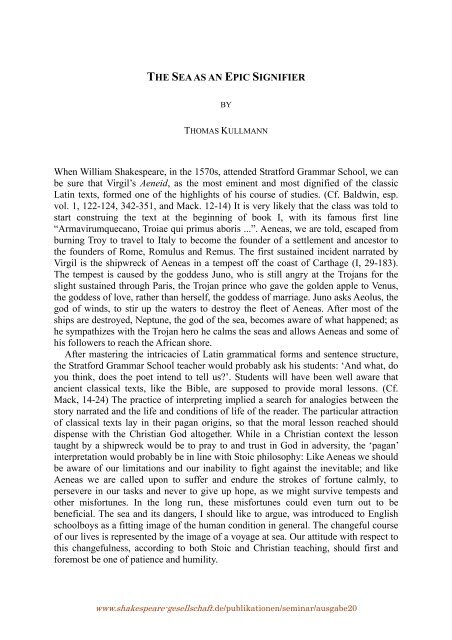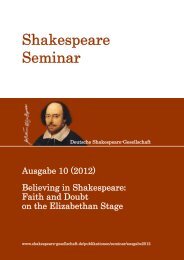Shakespeare Seminar - Shakespeare-Gesellschaft
Shakespeare Seminar - Shakespeare-Gesellschaft
Shakespeare Seminar - Shakespeare-Gesellschaft
Create successful ePaper yourself
Turn your PDF publications into a flip-book with our unique Google optimized e-Paper software.
THE SEA AS AN EPIC SIGNIFIER<br />
BY<br />
THOMAS KULLMANN<br />
When William <strong>Shakespeare</strong>, in the 1570s, attended Stratford Grammar School, we can<br />
be sure that Virgil’s Aeneid, as the most eminent and most dignified of the classic<br />
Latin texts, formed one of the highlights of his course of studies. (Cf. Baldwin, esp.<br />
vol. 1, 122-124, 342-351, and Mack. 12-14) It is very likely that the class was told to<br />
start construing the text at the beginning of book I, with its famous first line<br />
“Armavirumquecano, Troiae qui primus aboris ...”. Aeneas, we are told, escaped from<br />
burning Troy to travel to Italy to become the founder of a settlement and ancestor to<br />
the founders of Rome, Romulus and Remus. The first sustained incident narrated by<br />
Virgil is the shipwreck of Aeneas in a tempest off the coast of Carthage (I, 29-183).<br />
The tempest is caused by the goddess Juno, who is still angry at the Trojans for the<br />
slight sustained through Paris, the Trojan prince who gave the golden apple to Venus,<br />
the goddess of love, rather than herself, the goddess of marriage. Juno asks Aeolus, the<br />
god of winds, to stir up the waters to destroy the fleet of Aeneas. After most of the<br />
ships are destroyed, Neptune, the god of the sea, becomes aware of what happened; as<br />
he sympathizes with the Trojan hero he calms the seas and allows Aeneas and some of<br />
his followers to reach the African shore.<br />
After mastering the intricacies of Latin grammatical forms and sentence structure,<br />
the Stratford Grammar School teacher would probably ask his students: ‘And what, do<br />
you think, does the poet intend to tell us?’. Students will have been well aware that<br />
ancient classical texts, like the Bible, are supposed to provide moral lessons. (Cf.<br />
Mack, 14-24) The practice of interpreting implied a search for analogies between the<br />
story narrated and the life and conditions of life of the reader. The particular attraction<br />
of classical texts lay in their pagan origins, so that the moral lesson reached should<br />
dispense with the Christian God altogether. While in a Christian context the lesson<br />
taught by a shipwreck would be to pray to and trust in God in adversity, the ‘pagan’<br />
interpretation would probably be in line with Stoic philosophy: Like Aeneas we should<br />
be aware of our limitations and our inability to fight against the inevitable; and like<br />
Aeneas we are called upon to suffer and endure the strokes of fortune calmly, to<br />
persevere in our tasks and never to give up hope, as we might survive tempests and<br />
other misfortunes. In the long run, these misfortunes could even turn out to be<br />
beneficial. The sea and its dangers, I should like to argue, was introduced to English<br />
schoolboys as a fitting image of the human condition in general. The changeful course<br />
of our lives is represented by the image of a voyage at sea. Our attitude with respect to<br />
this changefulness, according to both Stoic and Christian teaching, should first and<br />
foremost be one of patience and humility.<br />
www.shakespeare-gesellschaft.de/publikationen/seminar/ausgabe20





